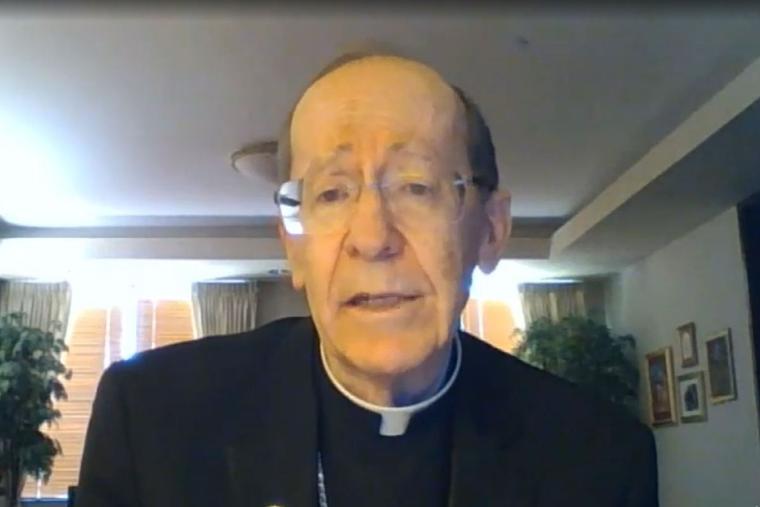Phoenix Bishop Defends Speaking Out on Communion: ‘The Care of Souls Is Our First Concern’
Teaching that Catholic politicians cannot support abortion and receive Communion is protecting the Eucharist, Bishop Thomas Olmsted told ‘EWTN Pro-Life Weekly’ on Thursday.

The bishop of Phoenix said on Thursday that he is protecting the Eucharist, not “politicizing” it, by teaching that Catholic politicians cannot support abortion and receive Communion.
In an interview with EWTN Pro-Life Weekly that aired on Thursday, Bishop Thomas Olmsted was asked to respond to claims that speaking out about pro-abortion Catholic politicians was “politicizing” the Eucharist.
“That’s not my intention at all. The Eucharist is the great treasure of the Church. And if it’s not being respected — if people don’t appreciate what this great treasure is — we need to help them understand that,” Bishop Olmsted told EWTN Pro-Life Weekly.
“The Second Vatican Council said that abortion is an unspeakable evil. If that’s true, how could someone who supports that, who requires others to pay for abortions — how could that not be a very serious sin and an obstacle for being ready to receive Christ appropriately in Holy Communion?” he asked.
Bishop Olmsted said it is his “duty” as a bishop to speak out on the matter.
“I think we bishops have a duty to speak as pastors. We’re not politicians; we’re pastors,” he said. “And that means the care of souls is our first concern, both the good of souls and anything that could be a scandal to them or could mislead them about what’s true and good and beautiful.”
Communion for pro-abortion politicians is once again a topic of discussion, as both President Joe Biden and House Speaker Nancy Pelosi, D-Calif., are Catholics who support taxpayer-funded abortion. The Code of Canon Law 915 states that Catholics “obstinately persevering in manifest grave sin are not to be admitted to Holy Communion.”
The U.S. bishops’ conference is expected to discuss “Eucharistic coherence” this year, covering the matter of Communion for pro-abortion Catholic politicians but framing the discussion within the broader context of general worthiness to receive Communion among Catholics.
Bishop Olmsted issued a statement on May 6 on Catholic politicians who support permissive legislation on abortion.
Bishop Olmsted was supporting a pastoral letter by Archbishop Salvatore Cordileone of San Francisco, which clarified that Catholics cooperating with abortion should not receive Communion. Archbishop Cordileone begged Catholic politicians in particular to not support laws making abortion more available, as they would be formally cooperating in the evil of abortion.
“Woe to us bishops if we do not speak clearly about the grave evil of abortion, and the consequences of any Catholic who participates in the act or publicly supports it by word or action,” Bishop Olmsted stated on May 6.
On Thursday, he said that all Catholics, not just politicians, should “rediscover” the “gift” of the Eucharist, including by receiving it worthily and not being conscious of having committed a serious sin since their last confession.
Bishop Olmsted says this teaching applies to all Catholics, not just public figures who cooperate in the evil of abortion by supporting permissive abortion laws.
“We don’t want to single out any one group,” he said. “Especially as we come out of this time of COVID, we need to rediscover and have a much deeper awe and wonder at the mystery of the Real Presence of Christ with us.”
Last week, the prefect of the Vatican’s Congregation for the Doctrine of the Faith, Cardinal Luis Ladaria, sent a letter to Archbishop José Gomez on the matter of Communion and Catholic politicians who support permissive legislation on grave evils.
Cardinal Ladaria instructed the U.S. bishops, before issuing any “national policy” on Communion, to first have a “serene” dialogue among themselves and ensure unity on the Church’s teachings against pro-abortion laws.
Then the bishops should dialogue with Catholic politicians who support policies contrary to Church teaching. After that, the Vatican said, bishops could determine the next course of action to teach on the Eucharist, while respecting the rights of local ordinaries, framing the discussion within the larger context of general worthiness to receive Communion, and avoiding the appearance of narrowing the Church’s focus to only one or two issues, such as abortion.
Speaker Nancy Pelosi, a Catholic who supports pro-abortion legislation, said on Thursday she was “pleased” at the document, which she claimed “basically said ‘don’t be divisive on the subject.’”
Bishop Olmsted refuted notions that the Vatican document instructed the bishops to not speak out on Catholic politicians supporting pro-abortion policies.
“As I read the statement, it doesn’t say that at all,” he said. “It encourages us, as we certainly desire to do, to be listening to one another as bishops and conversing with one another, and also listening and being in conversation with those who are not following the Church’s teaching.”
“That’s part of how fraternal correction, or correction from a bishop to one of the laity, should take place, I think,” he said.
Abortion is of “preeminent” concern to the U.S. bishops’ conference, he said. “And it’s something that’s also stated very clearly by Pope Francis, when we visited him in Rome,” he added.
Public figures are in a position to protect innocent lives, including the unborn, he emphasized.
“And the least, the most vulnerable, the most innocent, is the unborn child.”
- Keywords:
- bishop thomas olmsted
- ewtn pro-life weekly
- reception of the eucharist
- Eucharistic coherence













